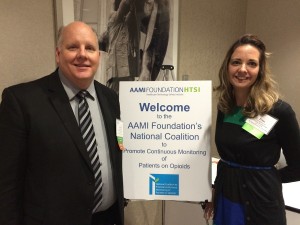
AARC members Jim Harrell and Pam Pohlenz offered the respiratory therapist point of view at the coalition meeting.
AARC was among the organizations represented at a recent coalition meeting on monitoring of patients on opioids, where respiratory therapists and this year’s AARC Congress Keynote Speaker were also featured.
Held Nov. 13-14, the Association for the Advancement of Medical Instrumentation (AAMI) Foundation Healthcare Technology Safety Institute (HTSI) convened a National Coalition to Promote Continuous Monitoring of Patients on Opioids in Chicago, IL. Over 50 stakeholder groups representing hospitals, national associations, patient advocates, and industry donors participated in the event to share information about negative outcomes due to unmonitored opioid use outside of the intensive care unit as well as sharing best practices to prevent these negative outcomes.
Dr. Shawna Strickland, PhD, RRT-NPS, RRT-ACCS, AE-C, FAARC, AARC Associate Executive Director, attended the meeting on behalf of AARC. In addition, other respiratory therapists were in attendance and among the presenters.
The role of the respiratory therapist in preventing negative outcomes due to opioid use in the hospital was highlighted throughout the meeting. AARC member Pam Pohlenz, BS, RRT, Respiratory Clinical Educator at St. Francis Medical Center in Grand Island, NE, discussed events at her facility that prompted a drill down on the problem and the resulting multidisciplinary intervention and outcomes.
Ms. Pohlenz, noting that the respiratory therapists are very hands-on with all events utilizing opioids for pain control, emphasized both respiratory therapy and nursing staff education as a cornerstone for implementing intervention and realizing positive patient outcomes. As a result of the intervention, this hospital noted a drop in the number of narcotic reversals needed and fewer escalations in levels of care while still being able to maintain patient pain control at satisfactory levels.
Jim Harrell, BS, CRT, Manager of Pulmonary Services at Sharp Memorial Hospital in San Diego, California, also presented at the meeting. Mr. Harrell reviewed his involvement in the preparation of the San Diego Patient Safety Council publication “Respiratory Monitoring of Patients Outside the ICU: Guidelines of Care Tool Kit” in June 2014. The toolkit provides evidence-based recommendations on safe and effective assessment, monitoring, and interventions for patients at risk for unrecognized respiratory depression.
Patient adverse events due to unmonitored use of opioid pain control through a patient controlled analgesia (PCA) device are pervasive. Patients who are classified as “low acuity” do not traditionally receive continuous monitoring. As respiratory therapists are aware, opioids can cause respiratory depression. Uncorrected respiratory depression can then lead to cardiac arrest and death.
Several patient advocacy groups at the meeting shared their experiences with loved ones who received PCA pain control in the hospital and subsequently died from opioid-induced respiratory depression and cardiac arrest. Patricia LaChance, patient advocate and AARC Congress 2014 keynote speaker, spoke of her husband’s preventable death in 2007 due to complications of his previously documented obstructive sleep apnea (OSA) and narcotic intolerance along with unmonitored use of a PCA and nursing-administered opioids.
The evidence supporting continuous monitoring for patients who are receiving opioid pain control outside of the ICU is well documented. AAMI Foundation HTSI will disseminate information from this event publicly to make sure that all stakeholders have this information and will conduct webinars, publish safety documents, and conduct outreach to improve patient outcomes.
Email newsroom@aarc.org with questions or comments, we’d love to hear from you.











